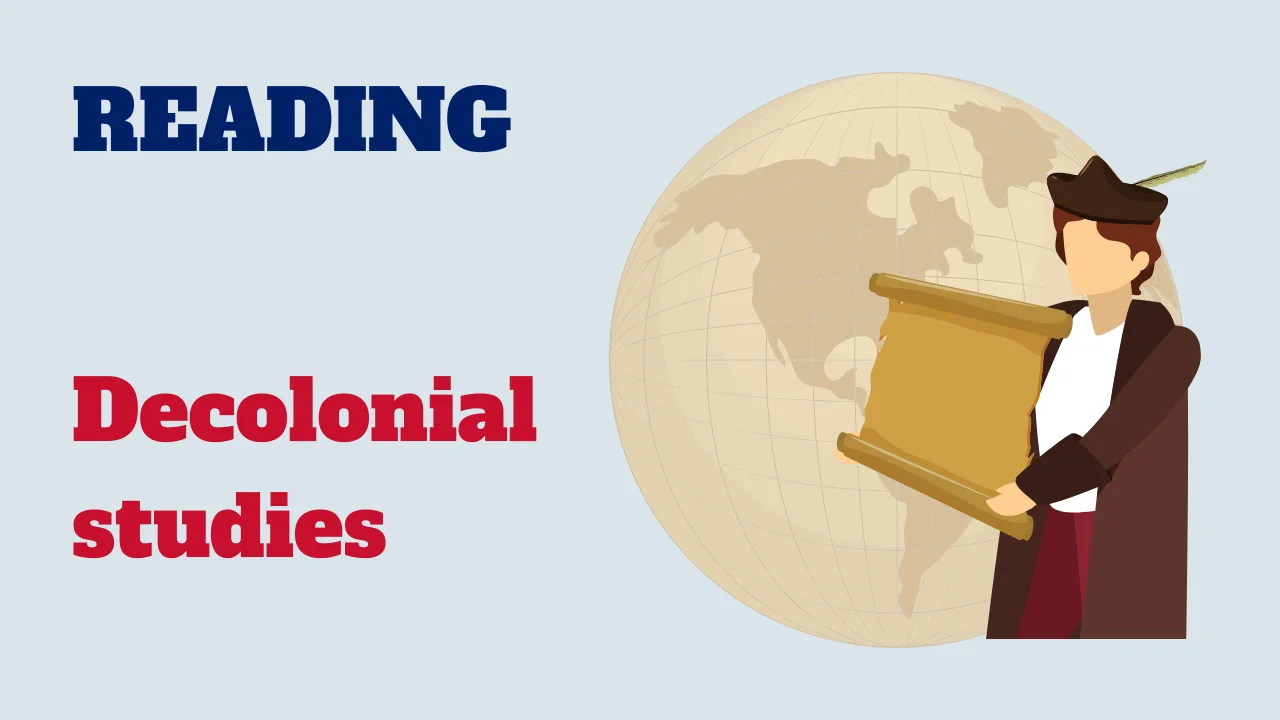The reading text introduces the field of Decolonial Studies, which examines the historical legacies and ongoing impacts of colonialism on societies and cultures worldwide.

Decolonial Studies aims to challenge dominant narratives, ideologies, and structures of power inherited from colonialism and to promote alternative perspectives that center on decolonization, social justice, and liberation.
Text: Decolonial studies
Decolonial studies is an interdisciplinary field that critiques and aims to dismantle the enduring legacies of colonialism in knowledge systems, culture, and societal structures. It seeks to understand and transform the ways in which colonial histories continue to influence modern societies, particularly in terms of power dynamics, cultural representation, and knowledge production.
Foundations and key concepts:
Decolonial studies build upon postcolonial theory but extend beyond it by focusing not only on the aftermath of colonialism but also on actively challenging and undoing colonial influences. Key figures like Walter Mignolo, Aníbal Quijano, and Enrique Dussel emphasize the need to decolonize the mind and the production of knowledge. They argue that modernity itself is intertwined with colonialism, creating a “coloniality of power” that persists in global social hierarchies, economic systems, and cultural norms.
Coloniality of power refers to the systemic and pervasive patterns of dominance established during colonialism that continue to shape global power relations. This concept highlights how colonial structures are reproduced in contemporary institutions, policies, and social practices, often marginalizing non-Western cultures and perspectives.
Goals and methods:
Decolonial studies aim to challenge and transform these structures by advocating for the recognition and inclusion of diverse epistemologies and worldviews. This involves deconstructing the Eurocentric narratives that dominate academia, media, and public discourse. Scholars in this field call for a re-evaluation of history, knowledge production, and cultural practices from the perspectives of those historically marginalized or colonized.
Decolonial methods include interdisciplinary research, critical pedagogy, and activism. These approaches seek to amplify indigenous voices, local knowledge, and alternative epistemologies, promoting a pluralistic understanding of reality. For instance, in education, decolonial approaches advocate for curricula that incorporate indigenous histories, languages, and perspectives, challenging the dominance of Western knowledge systems.
Applications and impact:
Decolonial studies impact various areas, including literature, history, art, and politics. In literature, it examines how colonial narratives have shaped literary canons and seeks to recover and elevate the voices and stories of colonized peoples. In history, it reinterprets historical events from the perspectives of those affected by colonialism, challenging dominant narratives.
In art and cultural studies, decolonial approaches critique the representation of non-Western cultures in museums and media, advocating for more authentic and self-represented narratives. Politically, decolonial studies inform movements for indigenous rights, land reclamation, and reparations, contributing to broader social justice efforts.
Challenges and future directions:
Decolonial studies face challenges such as resistance from established institutions and the complexity of dismantling deeply ingrained colonial structures. However, its growing influence reflects a global shift towards recognizing and addressing historical injustices and promoting a more equitable and inclusive world.
In summary, decolonial studies is a transformative field that seeks to deconstruct colonial legacies and promote diverse, inclusive knowledge systems. It challenges entrenched power dynamics and advocates for the recognition and valorization of marginalized perspectives, contributing to a more just and pluralistic global society.
Comprehension questions
Decolonial Studies offers critical insights into the historical legacies and ongoing impacts of colonialism while advocating for decolonization, social justice, and liberation. Through interdisciplinary approaches and key themes, this field challenges dominant narratives and promotes alternative perspectives grounded in principles of justice, equality, and solidarity.



